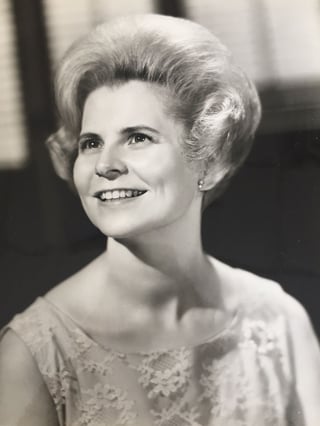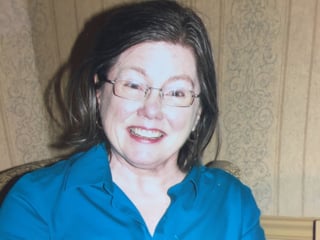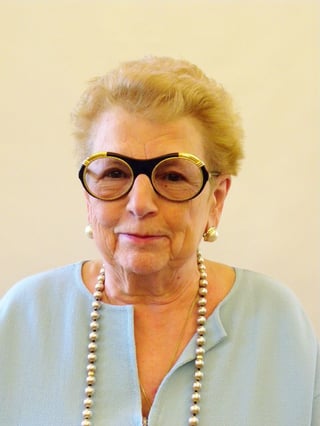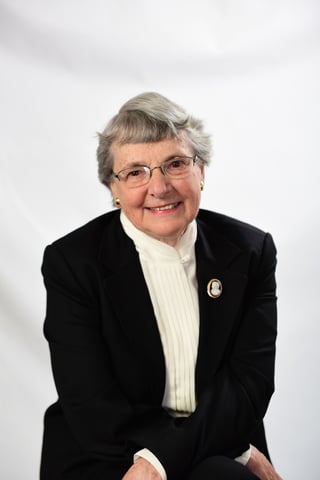
Women of Influence: Women That Make a Difference
Updated from the original publication on March 30, 2017.
As Women's Month comes to a close, we here at Presbyterian Senior Living want to  recognize some of the amazing women we are lucky enough to serve. We talked to four women about their lives and their experiences in a wide variety of professions. From writers to pharmacy owners, singers to professors, the women at Presbyterian Senior Living truly are extraordinary.
recognize some of the amazing women we are lucky enough to serve. We talked to four women about their lives and their experiences in a wide variety of professions. From writers to pharmacy owners, singers to professors, the women at Presbyterian Senior Living truly are extraordinary.
Lois Rosebrooks
 Lois Rosebrooks lives at Westminster Village at Dover. She was born in Massachusetts, went to school in Rhode Island, and lived most of her life in Brooklyn where she worked researching trademarks for 35 years. But her real passion was singing.
Lois Rosebrooks lives at Westminster Village at Dover. She was born in Massachusetts, went to school in Rhode Island, and lived most of her life in Brooklyn where she worked researching trademarks for 35 years. But her real passion was singing.
Lois originally studied to be a religious education director, and the first job she ever had was at a Baptist Church on Long Island. She stayed with church for three years, but decided to leave in search of better pay and more structure.
“Every member of the church was your boss, or, at least they thought they were.” She said.
The only housing she could afford at the time was a room in someone else’s house. In her search for more money, Lois took up a job at a company that sold frozen foods for a year, before finally ending up at a trademark company in 1961. There were a lot of women working there with her and only a few men. But she says even though she may have been more experienced and knowledgeable, the men acted like they owned the place.
“They wanted the main desk, and to not do the work. They didn’t want to hear anything about trademarks from people who probably knew a little bit more than them.”
For the most part, this didn’t bother Lois. She had more important things to focus on: her singing.
While she was working at the trademark office, Lois was also studying voice at Plymouth Church in Brooklyn, and doing some concert work in Manhattan. She was a fill-in Alto for the choruses.
The first major performance she was in was at the Metropolitan Opera. It was with Jerome Hines in the opera “I Am the Way,” a work about the life of Jesus. She was part of Hines’ local chorus, and would perform that opera throughout New York.
Eventually, she also started to pick up other freelance singing jobs.
“I could get a call on a Saturday saying ‘my alto is sick, do you know this piece? We’re doing it tomorrow.’ I didn’t really need an agent, my agents were the organists who knew me.”
She also sang regularly at Plymouth Church, and at Mother AME Zion Church in Harlem, the oldest African American church in Harlem. She was there for 19 years.
“Everyone loved me there and hated when I had to leave.”
After Lois retired from the trademark business, she started doing historical work at Plymouth Church. She decided to take on the project after she walked into the church’s archive room one day and saw it was incredibly disorganized. So she set up a program with a library class at the Pratt Institute to organize the records at no cost to the church.
Lois also did tours and presentations about the church for school kids. She says her work was so influential there that she still gets questions about the church's history from the people doing the presentations now! And when her knowledge was put to the test on the spot for this interview, she was able to completely retell the story of a nine year old black girl whose sale into slavery was stopped by the church in the 1800s.
Lois says one of the most meaningful moments she had at Plymouth Church was when a young boy wrote her a letter telling her how the lesson she gave them made him interested in history.
“What more can you ask for? When I got that, the tears started rolling.”
Today, Lois is still singing occasionally, mostly for Westminster Village’s choral groups. She says she’s valued there as a singer and historian.
Kate Simons
 Kate Simons also lives at Westminster Village at Dover in Delaware. She is a former pastor and writer of two children’s books. Born and raised in the Baltimore area to a religious family in 1954, Kate would humbly describe her childhood as “uneventful.” She says her parents constantly had a stream of Presbyterian clergy members running through their house. These ties to the Presbyterian ministry would be influential later.
Kate Simons also lives at Westminster Village at Dover in Delaware. She is a former pastor and writer of two children’s books. Born and raised in the Baltimore area to a religious family in 1954, Kate would humbly describe her childhood as “uneventful.” She says her parents constantly had a stream of Presbyterian clergy members running through their house. These ties to the Presbyterian ministry would be influential later.
After high school, a mentor suggested that Kate apply to the University of Rochester in New York. She did and was accepted. She spent her years there studying Developmental Psychology.
“That was my first real adventure,” she said.
After graduating from Rochester, Kate only had a few options when considering a job. Teaching and nursing were the two biggest, but that’s not what she wanted to do. Instead, she followed the example her parents had set for her in her youth and chose religion. But to get the job she wanted, she would need to go to Seminary.
While she was in Seminary, it was expected that Kate would also have a job on the side. Because of this, she actually had three separate jobs with Presbyterian ministers in Philadelphia.
“I probably spent more time working than at school!” she jokes. But she looks back fondly on the experience. “The Presbyterian ministry enabled me to grow up in a safe place, with schooling, until I went on to be a pastor.”
Kate became a pastor in 1978, and continued into the 2000s. She served in congregations in Pennsylvania, Maryland, Iowa, Long Island, and Delaware. It was during this time that she adopted a child from Honduras.
“My world expanded because of her."
It was also during this time that she came up with the idea for her first book, a coloring book for families designed to provoke discussion. Kate says she was very interested in “anti-coloring books” when her daughter was little. Anti-coloring books provide an elementary drawing, and let the child color everything in and fill out the rest of the scene.
Her first book, “Are You Filled With Joy? Color Me Joy” was published a few years ago, but Kate says she spent decades coming up with the idea for it. It focuses on finding joy in the midst of sorrow, and comes with a discussion guide for parents and children to talk through together. It also provides readers with steps they can take after the discussion, like donating to charity or doing volunteer work, in order to give back to the world.
“I know a lot of people who read, and they’re edified, but it doesn’t result in action. And the reason why I’m involved in the church is because they do mission and encourage people to be involved.”
Her second book “Are You Making a Home? Color Me Home” is in the same vein.
Both books were born from stories in Kate’s own life, particularly a story about a woman who had to provide care for her granddaughter after her daughter died.
Kate says she is still involved with the church, although not as a pastor. She is also currently working on rewrites for her second book. The new version will be available soon.
Bernice LaGuttuta
 Bernice LaGutta is a retired pharmacist living in Kirkland Village in Bethlehem, Pennsylvania. She was born and raised in Bethlehem’s sister city of Easton. Bernice graduated from the Fordham College of Pharmacy in 1957 and opened up her own pharmacy with her husband in 1959. They were in business together for 41 years.
Bernice LaGutta is a retired pharmacist living in Kirkland Village in Bethlehem, Pennsylvania. She was born and raised in Bethlehem’s sister city of Easton. Bernice graduated from the Fordham College of Pharmacy in 1957 and opened up her own pharmacy with her husband in 1959. They were in business together for 41 years.
Bernice was the first one in her family to go to college. Her mother was a high school graduate while her father only completed 8th grade.
“Entering into science and math took every minute of the day that I had,” Bernice said. “But it was well worth it.”
But it’s not the only thing she was doing at school. While she was studying pharmaceuticals, she was also learning Italian and taking music and voice lessons on the side. This was because her uncle thought she should go into the music business. He wasn’t the only one who thought that either. Her teachers had told her she had the voice for opera, and could make it on Broadway. But in her sophomore year of college she had to choose a major.
“[My mother] asked me ‘what are you going to do if your husband gets sick? What’s going to happen’” Bernice remembered. “So I said, I guess I’ll go to work.”
She chose to stick with her pharmaceutical studies, and says she’s happy she did.
There were only 5 women in her class, including herself, and Bernice says they all became close friends. Her future husband also joined the school in her sophomore year. After graduating, she went to New York to work for two years, with the hopes of working at a pharmacy to get her license. The only problem was the pharmacy she applied to didn’t want to hire her for fear of future competition.
So instead, she said she would work for free. She lived at the Sisters of Mercy's Susan Devon residence for businesswomen during this time. After the two years were up and she got her license, she and her husband set up their own pharmacy in Palmer Township, Pennsylvania.
Bernice says her father actually did the masonry for the building, and it’s still standing to this day. She and her husband lived above the pharmacy for eight years, and for the first three of those years they ran 24-hour service.
“It was worthwhile, but there was a lot of sacrifice involved.”
During this time, she and her husband were putting a lot of their money into stock of a national hotel chain. And in 1985 it paid off. Bernice says she heard on the news that the hotel chain was considering a hostile takeover that year. Unhappy with the news, she went to express her opinions to the owner. She says that because of the amount of shares she owned, the owner agreed to hear her out. He was moved by her presentation and wanted to do something for her, so they set up a deal where she could get points towards any of the chain’s hotels when she makes certain purchases.
Bernice says this deal has allowed her and her husband to travel, something she continues to do today.
The pharmacy closed in 2000 as her husband’s health declined. Their son helped for a time, but he suffers from a medical condition and can’t get a driver’s license. Eventually, she was forced to sell the pharmacy.
After her husband passed away, Bernice moved in to Kirkland Village to be close to her son. They travel and take vacations together now.
Betty Ann Cherry
 Betty Ann Cherry lives in Westminster Woods at Huntington in Huntington, Pennsylvania. She is a former professor at Juniata College, and had the unique experience of teaching there while her father was president of the school.
Betty Ann Cherry lives in Westminster Woods at Huntington in Huntington, Pennsylvania. She is a former professor at Juniata College, and had the unique experience of teaching there while her father was president of the school.
Betty Ann was born in Huntingdon in 1934, and her family's history is intertwined with Juniata's. Both her grandfather and her father were presidents of the school. When she was younger, there was no designated guest house for visitors, so anyone of importance who was visiting the college would stay at her family’s house. She says she can still remember having to go upstairs with her brother to play if anyone was coming over. And if they were staying the night, then the children would sleep on cots in their parents’ room.
“The house was the president’s home. Period.” Betty Ann said. “And the rest of the world revolved around that.”
While her husband was a Juniata grad (and later also a teacher), she and her brother were not allowed to go to the school. She studied European History at the College of Wooster in Ohio, and then Columbia University in New York. She graduated there in 1958 and began teaching at Juniata in 1962.
It wasn’t quite as easy as that though. Her father did not want to hire her at first, but staffing problems made it a necessity.
“Dad didn’t believe in nepotism and he was not happy with hiring me.”
For the six years she taught while he was president, they had a deal where she would only be on campus during class, and no other time. So she held office hours in her home. She also wasn’t on any faculty committees. Although that part was her own choice. She says she didn’t want the other teachers to have to deal with the president’s daughter.
Eventually though, Betty Ann did such a great job as a teacher that her father apologized for being so against her hiring.
She taught the same subject she studied: European History. By the time she was working at Juniata, Betty Ann says there were female Ph.Ds in every department. But that wasn’t the case when she was growing up.
“I was lucky. I had parents who while I was growing up thought I could do anything I could put my mind to and there weren’t limits. And that was a little unusual in the 40s and 50s.”
She says many students didn’t know she was related to the president. They knew she was Professor Ron Cherry’s wife, but not Calvert Ellis’ daughter. The faculty on the other hand, thought she had much more power then she really did. Not that it would have mattered.
“I’m not a political animal and I didn’t play those games,” She said. “I was a teacher first and a historian second.”
Betty Ann ran her classes personally with discussions, a lot of writing, and no objective tests. After her husband passed in 2000, she took four different trips with alumni to places she had taught them. She went to France, Greece, Italy, and Hungary and Austria.
She says, “That is about the nicest compliment you can get.”
Betty Ann is still active in the school, but has mostly stepped away from everything except alumni development. In fact, last year’s 50 year reunion was for the first class she ever taught.
She also delivered the commencement address for Juniata’s 2016 class. The college gave her an Honorary Doctor of Humane Letters degree in 2005.
Of course, these are not the only influential women at Presbyterian Senior Living. Many of the people we serve have led an interesting and impactful life. For more information on how Presbyterian Senior Living can enrich your life, contact us today.
About Presbyterian Senior Living
As the trusted leader in aging services, Presbyterian Senior Living combines over 97 years of experience with innovative approaches to senior communities and services. Across our 27 communities in PA, MD, OH, and DE, we serve over 6,000 seniors. We are committed to: FOSTERING teamwork and responsibility. UPHOLDING integrity in every action. EMBRACING innovation to create opportunities for everyone’s success. LEADING with compassion and respect.


